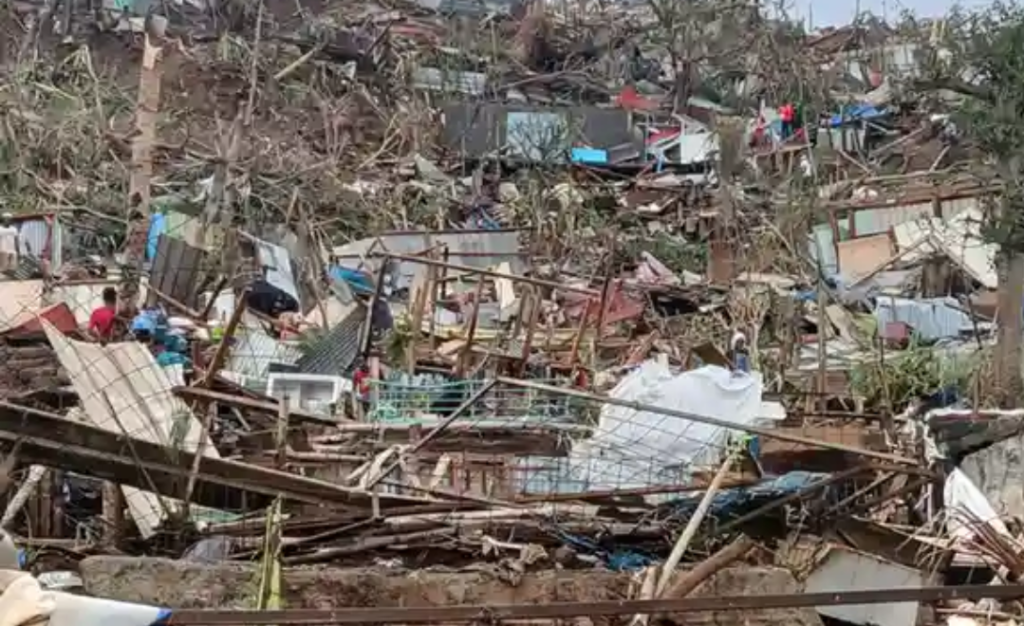
Cyclone Chido: Death and Destruction in Mayotte and Mozambique
Cyclone Chido has left a trail of devastation across Mayotte and Mozambique, claiming lives and causing significant damage. This natural disaster, characterized by fierce winds and heavy rainfall, has disrupted the lives of thousands. Understanding the events surrounding this cyclone is crucial for future preparedness.
Devastating Impact of Cyclone Chido
Mayotte Casualties and Infrastructure Damage
In Mayotte, the storm has struck hard, resulting in multiple fatalities and extensive infrastructure damage. Reports indicate:
- Casualties: At least 15 people have lost their lives due to the cyclone’s fury.
- Infrastructure: Roads and bridges have been washed away, isolating communities and impeding rescue operations.
- Housing: Many homes are either damaged or completely destroyed, leaving families displaced.
Mozambique’s Agricultural Impact
Mozambique, known for its rich agricultural land, also faced severe consequences. The heavy rains have caused significant flooding, affecting crops and livestock. Here’s what was reported:
- Crop Loss: Over 50% of maize and cassava crops were destroyed in the worst-hit areas.
- Livestock Impact: Flooding has led to the loss of thousands of livestock, impacting food security and local economies.
- Economic Strain: The agricultural impact could set back recovery efforts by years, affecting both livelihoods and food supply.
Initial Response Efforts
The response to Cyclone Chido has been immediate yet challenging. Emergency services and local authorities are working tirelessly to rescue those trapped and provide essential supplies. However, the severity of the damage complicates these efforts.
- Rescue Operations: Helicopters and boats have been deployed to reach isolated areas.
- Relief Supplies: Local charities and international organizations are mobilizing food and medical aid.
- Community Support: Volunteer groups have sprung into action, offering shelters and food to displaced families.
Cyclone Chido’s Trajectory and Intensity
Formation and Strengthening
Cyclone Chido formed in the Indian Ocean and quickly intensified, reaching hurricane-level winds. Meteorologists noted:
- Initial Development: Chido developed rapidly due to warm ocean waters.
- Peak Intensity: Wind speeds reached over 140 km/h, making it one of the strongest cyclones of the season.
Unusual Path and Weather Patterns
The cyclone’s unusual path defied standard weather predictions. Instead of following typical routes, it veered towards the coast, leading to unexpected levels of destruction.
- Weather Anomalies: Changes in ocean temperatures and wind patterns contributed to this unpredictable trajectory.
- Forecasting Challenges: The storm’s rapid changes raised difficulties for meteorologists, leaving communities with little warning.
Forecasting Challenges and Accuracy
Accurate forecasting is vital in saving lives during natural disasters. Unfortunately, Cyclone Chido exposed gaps in current forecasting methods.
- Limited Data: Inadequate data from the affected regions hampered predictive models.
- Need for Improvement: Enhanced technologies and better data collection methods are crucial to improve future forecasts.
The Human Cost: Stories of Survival and Loss
Individual Accounts of Cyclone Chido’s Impact
Survivors of Cyclone Chido have shared harrowing stories that highlight the human cost of this disaster. One account tells of a family who lost their home but escaped to higher ground when the storm hit.
Community Support and Resilience
Despite the tragedy, communities have come together. Neighbors are helping each other to rebuild homes and share resources. This spirit of unity is essential for recovery.
Mental Health Concerns in the Aftermath
The psychological toll of such events often goes unnoticed. Survivors face anxiety and grief, needing mental health support to help them heal.
Long-Term Recovery and Reconstruction
Challenges Facing Mayotte and Mozambique
The recovery process will be lengthy and complex. Obstacles include:
- Infrastructure Repair: Extensive work is needed to rebuild roads and bridges.
- Health Services: Reestablishing healthcare services is crucial for preventing disease outbreaks following the flooding.
International Aid and Disaster Relief
International support will play a significant role in recovery efforts. Aid organizations are already coordinating responses, with:
- Funding Initiatives: Donations and funding drives are essential to mobilize resources.
- Volunteer Networks: Volunteers from around the world are stepping in to assist with recovery operations.
Sustainable Development Goals and Disaster Preparedness
Rebuilding efforts must align with sustainable development goals. This approach will enhance future resilience and preparedness against similar disasters.
Lessons Learned and Future Preparedness
Improving Early Warning Systems
To save lives in the future, enhancing early warning systems is vital. This could include:
- Technology Upgrades: Investing in better forecasting technology.
- Education Programs: Training communities on how to respond to warnings.
Strengthening Infrastructure Resilience
Rebuilding must focus on creating resilient infrastructure capable of withstanding storms. Key actions include:
- Improved Design: Using better materials and designs to withstand high winds.
- Regular Maintenance: Ensuring infrastructure remains in good condition.
Community-Based Disaster Risk Reduction
Local communities should be involved in disaster preparedness planning. This can include:
- Training Workshops: Educating families on emergency protocols.
- Local Committees: Establishing groups to oversee disaster preparedness efforts.
The Role of Climate Change
Climate change has intensified weather patterns, leading to more severe storms. Understanding this connection is essential for long-term strategies.
Conclusion: A Call for Global Action
Cyclone Chido serves as a stark reminder of nature’s power and the human cost of such disasters.
Key Takeaways on the Cyclone‘s Impact
- Lives Lost: The cyclone has tragically taken lives and shattered families.
- Infrastructure Damage: Roads, homes, and agricultural lands have been devastated, leading to long-term economic challenges.
Recommendations for Enhanced Disaster Response
- Invest in Technology: Upgrading weather forecasting technology is crucial.
- Implement Training: Communities need education on disaster preparedness.
Strengthening International Cooperation for Disaster Mitigation
Global collaboration will enhance disaster response, ensuring affected areas receive the help they need to rebuild and recover.
UK Makes History: First European Nation to Join Indo-Pacific Trade Bloc

